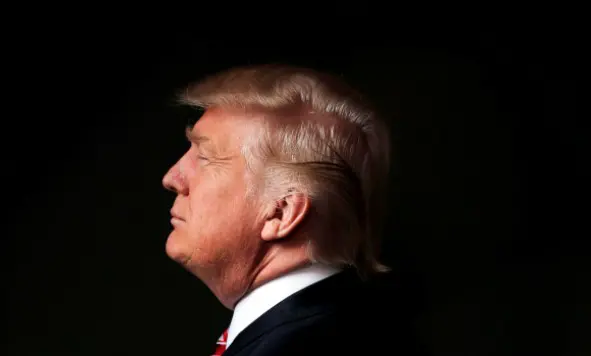Republican presidential candidate seen by EIU as major threat to the world economy.
In mid-March, the Economist Intelligence Unit (EIU), part of the sister company to The Economist magazine, published its latest list of risks facing the global economy.
The ones with the highest ‘intensity’ — a product of probability and impact — were a hard landing for China’s economy and an emerging market (EM) debt crisis, while those with the lowest were an oil price shock and a British exit from the European Union (EU), or ‘Brexit’, following a closely watched referendum next month.
Yet it was one of the risks with a moderate intensity — more significant than the rising threat of jihadi terrorism and almost as severe as the risk of a break-up of the eurozone — that caught the eye of journalists.
The victory of Donald Trump, the flamboyant property developer who now looks certain to secure the Republican presidential nomination in July in the US election, due in November is, according to the EIU, a major risk confronting the world economy.
Over the next several weeks, financial markets are likely to become a lot more concerned about the threat of a Trump presidency than they were previously.
Indeed some of Trump’s policy pronouncements have already drawn scorn from economists and investment strategists.
Donald Trump Jr., left, and Eric Trump, right, applaud their father during a caucus night rally in Las Vegas on Feb. 23, 2016. Photo: Bloomberg
Earlier this month, the Republican party’s presumptive presidential nominee cast doubt over the sanctity of the guarantees underpinning US government debt by suggesting that the country could “do discounting” in the $14 trillion treasury bond market by refinancing bills at lower interest rates over longer durations.
His proposal to refinance US sovereign debt is not in itself a miscalculation.
What is, however, is his willingness to call into question the repayment of US debt at a time when his fiscal plans lack credibility. Trump is simultaneously proposing to reduce the US public debt while slashing taxes and increasing expenditures sharply.
The property mogul has also cast doubt on the direction of the dollar at a time when currency markets are extremely volatile.
By favouring a weaker exchange rate in order to restore the US’s export competitiveness — the billionaire is a fierce critic of China, which he accuses of persistently manipulating its currency in order to gain unfair advantage over US manufacturers — Trump is adding fuel to the fire of the so-called “currency wars” which have destabilised foreign exchange markets.
He is also endangering the status of the dollar as a global reserve currency, even though US policymakers, including the Federal Reserve, central bank to the world’s biggest economy, favour a weaker currency. The dollar index, a gauge of the performance of the greenback against a basket of its peers, has already fallen nearly 5 per cent since the end of January.
But what do financial markets make of Trump’s policies and how should investors be positioning themselves for “Trump risk”?
US politics is already gaining in importance in investors’ minds. According to this month’s Global Fund Manager Survey published by Bank of America Merrill Lynch (BAML), the US political scene is now among the most important tail risks facing markets — in stark contrast to last month when it was at the bottom of the list of investor concerns.
However, investors are notoriously poor at assessing and pricing in political risk — not least if the risk in question is not an immediate concern and unlikely to materialise.
Hillary Clinton, the Democratic party’s presumptive presidential nominee, is still ahead of Trump in the opinion polls — admittedly her lead has narrowed over the past several weeks — and enjoys strong support among black, Hispanic and female voters, according to the latest NBC News poll.
This suggests that investors will only begin to fret once a Clinton versus Trump race begins in earnest in early September.
If Trump secures the Republican party’s presidential nomination — which now seems a foregone conclusion — and pulls ahead of Clinton in the polls, markets will start to price in a risk premium for US assets, with the dollar most at risk in what could be a repeat of the pre-EU referendum volatility that has turned the pound into the worst-performing major currency this year.
Britons will vote in June whether to leave or stay in the 28-nation union.
US equities could also be hit, dragged down by banking stocks which could suffer because of Trump’s hostility to Wall Street.
Still, some hedge fund investors are backing Trump in the expectation that he will be forced to moderate his views as the election draws closer.
While this is distinctly possible, investors downplay “Trump risk” at their peril.
Nicholas Spiro is a partner at Lauressa Advisory.
(SOUTH CHINA MORNING POST)
 简体中文
简体中文

